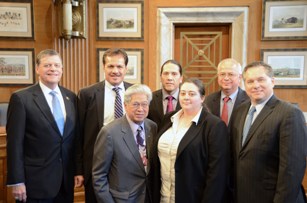Washington D.C. –
U.S. Senator Daniel K. Akaka (D-Hawaii), Chairman of the Senate Committee on Indian Affairs, held an oversight hearing today to examine the ripple effects that the Carcieri v. Salazar case has had on jobs, economic development and public safety in tribal communities since the U.S. Supreme Court’s ruling two years ago.
 “Trust land is essential to a tribe’s ability to exercise its inherent sovereignty,” said Chairman Akaka. “Tribes provide a wide range of governmental services to their members such as providing schools, community centers, health clinics, and law enforcement. Trust lands are vital for tribes’ successful economic development and self-governance.”
“Trust land is essential to a tribe’s ability to exercise its inherent sovereignty,” said Chairman Akaka. “Tribes provide a wide range of governmental services to their members such as providing schools, community centers, health clinics, and law enforcement. Trust lands are vital for tribes’ successful economic development and self-governance.”
In 2009, the Supreme Court issued its decision that the Secretary of the Interior did not have the authority to take land into trust for a tribe that was not under federal jurisdiction at the time the Indian Reorganization Act was enacted in 1934. The Supreme Court decided that the Act only applied to tribes who were “under federal jurisdiction” when it was passed in 1934.
Today the Committee heard testimony from U.S. Representative Tom Cole (R-Oklahoma), the Deputy Whip of the House Republican Conference, and from federal officials representing the Department of the Interior, witnesses representing the Native American Rights Fund and Native American Finance Officers Association, and two legal scholars.
Witnesses noted that the uncertainty created by the Carcieri decision makes it more difficult for tribes to create jobs on reservations and in surrounding communities and to attract Native business development opportunities.
“Current laws make it difficult to develop trust land,” said Representative Cole. “Projects that should take weeks to plan and secure regulatory approval for can take years. The federal government already puts burdens on tribal land, the Carcieri decision just adds to those burdens by making it harder for tribes to manage and grow their sovereign territory.”
William Lomax, President of the Native American Finance Officers Association, said, “The great uncertainty caused by that decision is preventing tribes from every part of the country from growing and diversifying their economies, engaging in economic development, and creating new jobs. I want to underscore that last point – Carcieri is killing jobs in Indian Country, and it is killing jobs in the local non-Indian communities which neighbor Indian Country.”
Witnesses testified that the Carcieri decision has also led to an increase in litigation which diverts tribal resources from much-needed federal programs and has created potentially dangerous public safety concerns resulting from uncertainty regarding the status of tribal lands.
“This may soon allow the defense attorneys, prosecutors, and judges in criminal cases to determine the parameters of Indian country and reservations, a right reserved to Congress and the delegated to the Secretary of the Interior,” said Carl J. Artman, who served as the Assistant Secretary of the Interior for Indian Affairs under the Bush Administration. “Criminal jurisdiction in Indian country is confusing, but it will become debilitating if the Carcieri holding is not addressed.”
“A legislative fix would clarify Congress’s policy and the Administration’s intended goal of tribal self-determination,” added Larry Echo Hawk, Assistant Secretary for Indian Affairs at the Department of the Interior. “A legislative fix will help the United States meet its federal trust obligation.”
Chairman Akaka introduced S. 676, the Carcieri “fix” legislation, on March 30. “I am heartened by the bipartisan and bicameral concern and support of this much needed legislation, which will meet our trust responsibility,” Akaka said as the hearing drew to a close.
“Congress was clear when it enacted the Indian Reorganization Act in 1934, and again with amendments to the Act in 1994. It is the responsibility of Congress to act when its intentions are misconstrued by the courts and so it must act now,” Akaka said.
More information and an archived webcast is available on the committee’s website: LINK
-END-
Contact: Emily Deimel
Contact Phone: (202) 224-2251
Contact E-mail: emily_deimel@indian.senate.gov
